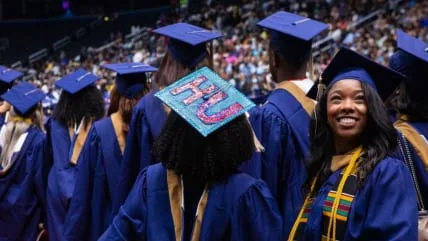
Editor’s note: The following article is an op-ed, and the views expressed are the author’s own. Read more opinions on theGrio.
When it rains, it pours. Especially in Black America.
Over the past few weeks, issues that have plagued Black America for years garnered national attention while highlighting our precarious position in a country that continues to impede our collective progress. Taken together, three tempests — the Supreme Court’s overturning of affirmative action, their refusal to alleviate rampant student loan debt and the disproportionate criminalization of Black business leaders — represent a tsunami of wrongs that could cripple our communities today and for years to come.
Think about it. If you wanted to destroy a community, this would be the way to do it. First, you would hamper the choices and opportunities of their college-age students by limiting their access to the full range of educational resources that could benefit them.
Second, even if they were able to attend college, you would bury them in debt so they could not achieve the type of financial independence and prosperity that college should offer them.
Finally, you would ensure they never get a fair shot at honest competition and that their business aspirations would be crippled by a lack of investment upfront, and the disproportionate or undue criminalization of those few who eventually achieved commercial success.
And there you have it. Black America amidst the perfect storm.
The recent overturning of the use of race-conscious college admissions by the U.S. Supreme Court is sure to have a harmful effect on our community. The court’s decision, effectively ending affirmative action at American colleges and universities, has real-world examples of its crippling impact. In 2006, 10 years after California’s Proposition 209 banned consideration of race in the state’s admissions, only 96 Blacks were admitted to a nearly 5,000-person UCLA freshman class.
This figure, noted Time magazine, had been “unseen at one of California’s most prestigious public universities since the early 1970s,” a fact made more profound by the school’s status as “a respected institution in one of America’s most diverse cities.”
One day after gutting affirmative action, the Supreme Court struck down the Biden administration’s $400 billion plan to cancel student debt for millions of Americans. The court ruled the Biden administration needed congressional approval to enact such a one-time student debt relief program. Given the substantial number of African-Americans currently saddled with excessive student loan debt — particularly African-American women — the impact of such a ruling is as disastrous as it is apparent.
“Student loan debt has particularly for women and Black women, saddled them with this absorbing amount of debt that they cannot climb over,” explained Democratic strategist, Ameshia Cross, in a recent interview with theGrio. “Two-thirds of the $1.7 trillion in student loan debt that is held in this country is held by Black women … this is something that is keeping this population back.”
The recently introduced campaign, “Entrepreneuring while Black,” draws much-needed attention to yet another ill facing Black America — the systemic racial discrimination Black entrepreneurs face when trying to secure investment to launch a business and the double standard that criminalizes their actions when their white counterparts get a pass for the same conduct.
“Companies backed by venture capital drive the U.S. economy, accounting for hundreds of billions of dollars in sales and profits,” points outs Freada Kapor Klein and Mitchell Kapor, in their new book, “Closing the Equity Gap: Creating Wealth and Fostering Justice in Startup Investing.”
“The problem is that most of the wealth created winds up enriching elites, while the businesses funded by venture capitalists widen economic inequality,” the authors note.
This is an issue that affects Black entrepreneurs regardless of business size. An Accenture analysis showed that “large banks approve about 60% of loans sought by white small business owners, 50% of loans sought by Latino or Hispanic small business owners, and just 29% of loans sought by black small business owners.” If that’s not enough, a 2022 study of white collar-crime sentencing revealed that “even though most white-collar crimes are committed by people who are white, people of color are incarcerated more frequently and for longer: African American adults are 5.9 times as likely to be incarcerated than whites.”
The many examples of Black entrepreneurs and business leaders whose actions have been criminalized while their white counterparts were held harmless for comparable actions are too many to mention but include Franklin Raines, Calvin Grigsby, Carlos Watson, Robert Smith, and others.
Taken together, this perfect storm of events — the overturning of affirmative action, the retention of student loan debt, and the disproportionate criminalizing of black business leaders —presents a daunting challenge to our community at a time when we need it least. And though we may not be able to stop the storm from swirling, there are things we can do to take some cover so we hopefully don’t get drenched.
First, we can support our HBCUs even more. These institutions have always played an instrumental role in nurturing Black students, and they will undoubtedly take on an increased role in the years to come. They are more affordable than many majority-white institutions and students can generally graduate with less debt. Furthermore, they can continue to serve as platforms outside of Silicon Valley to attract investment for aspiring Black entrepreneurs.
Second, we can highlight and support those colleges that are working to ensure racial diversity in this post-affirmative action environment. In a recent interview with NYU News, Deborah Archer, a professor of clinical law and American Civil Liberties Union president, pointed out the actions taken in those states that had already prohibited race in college admissions prior to the SCOTUS ruling: “Those efforts have included: Evaluating academic achievement in context; giving credit to students who have attended underserved and underrepresented schools; considering socioeconomic status and English language learner status; considering group or community demographics; and expanded outreach and recruitment efforts.”
Third, despite the threatening storm, we cannot lose hope and stop our struggle for a fair seat at the American economic table. As Martin Luther King Jr. aptly observed: “What does it profit a man to be able to eat an integrated lunch counter if he doesn’t earn enough money to buy a hamburger or a cup of coffee?”
We have to not only hope but aggressively demand access to the material resources we need to sustain our families for generations to come.


Stephanie Robinson, Esq. is a lecturer on law at Harvard Law School where she teaches on issues of democracy, media, and race, and their intersections with the law. She is the president of Sly Bear Media Group. She is the former chief counsel to Sen. Edward M. Kennedy and was the political and social commentator for “The Tom Joyner Morning Show,” offering her perspective weekly to over 10 million people on the day’s most pressing issues.
TheGrio is FREE on your TV via Apple TV, Amazon Fire, Roku, and Android TV. Please download theGrio mobile apps today!




